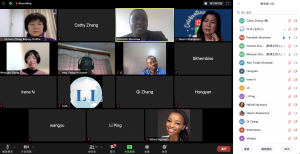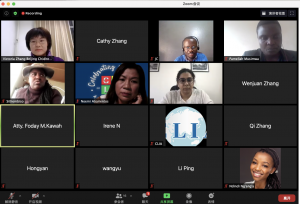The 6th seminar of the Global Child Law Fellowship focused on the mindset, strategy, and approach for transforming lawyers into leaders for Child Rights. The consultant of the program, Wenjuan Zhang, led the discussion. Eight fellows shared their understanding regarding the mindset, strategy, and approach, combining their real-life experiences as child rights practitioners.

“We lawyers usually define social problems in a narrow way and mainly refer to litigation as the approach for tackling issues. This may train us to be a wise litigator but not as a qualified problem-solving leader. Enabling the transformation from being a wise litigator to be leaders for child rights, we need to have a substantial transformation in terms of mindset, strategy, and approach in addressing pressing child issues.” Wenjuan outlined the reasons behind the emphasis on mindset, strategy, and approach for child rights lawyers.
Foday used his experience to reflect on problem-solving as a child rights lawyer. “Problem-solving is trying to find solutions to a situation that you confront.” He took girls not going to school as an example, introducing both the micro- and the macro- steps he took to solve the problem.
According to Wenjuan, mindset determines the attitude, behavior, and capacity for problem identification and problem-solving. She advised all the fellows to shift their mindset from being adversarial to being positive and collaborative. Irene said, “With regard to my mindset, I need to make sure my mindset is positive to provide effective solutions. Sometimes the issues go beyond ad hoc.” This point also made a significant impact on other fellows.
In addition, strategy is the crucial step to translating the mindset into reality. The three strategies Wenjuan pointed out to apply the positive and collaborative mindset are networking, institutionalization, and empowerment. “Because we do face various problems, we need to assist children in court and engage in other after-court interventions. Coming together, reaching out to other departments really helps, because, in the network, we can find solutions for the children.” Ndindi Ng’ang’a summarizes her main takeaway from this seminar, identifying the importance of networking and reaching out to other stakeholders in order to provide real help in time to children in need.
Further, translating the mindset and strategy into a practical approach would be a comprehensive service model by combining direct legal service, empirical research, policy advocacy and legal education. “I’ve learned the power of coordination and the power of engagement of various stakeholders. As child rights advocates, we can’t solve problems alone. For example, there are short-term problems such as clinical prep that need immediate responses, and for the mid-term, calling the police. Then in the long-term, reaching out to other agencies to further help those children.” Sithembiso shared what she learned from the seminar by combing her real-life experience and applying it to the practical approach.
Noemi also shared her experiences relating to the mindset, strategy, and approach. She was encouraged to think outside the box, focusing not only on the immediate short-term concern when dealing with children. It goes beyond litigation, and long-term problems need to be considered.
Jean-Claude denoted that the discussion highlighted the importance of networking. “Collaborative problem solving may be difficult depending on how the opposing party welcomes this approach.” The collaborative mindset calls on the professionals to invite other stakeholders as part of the solution force instead of viewing them as troublemakers.
Pamellah concluded that lawyers as leaders need to change their mindset. To be humble and to be able to cooperate with other professionals. It also coincides with the notion of empowerment, that lawyers as leaders should not just treat the beneficiary as a service receiver but as an actor to be empowered and as an agent for social change.
As Wenjuan concluded, we could create the infrastructure for cultivating Child Rights experts and leaders through a more comprehensive service model.

